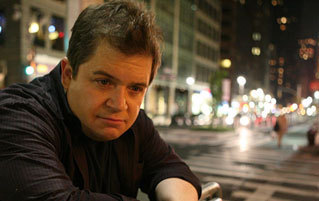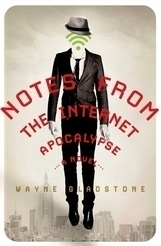3 Modern Satirists Screwed by People Who Didn't Get the Joke

I've spent most of my life loving satire and hating people who don't understand it. It was that love and hate that inspired me to write two prior columns about wrongly attacked satirists. But I'm pulling back on my animosity these days, especially because it has become increasingly clear that the percentage of humanity that actually appreciates satire is incredibly small. For many, it's like being color-blind. They just can't do it.

For example, some people can't see that this is a "42," or that I'm joking about that.
How hard is satire? Well, sometimes even people in the business of satire get it wrong. Respected publications miss the point all the time. It happened in the cases below, and it's even happened to me to a minor extent with my new novel, Notes from the Internet Apocalypse, which in part satirizes bad online behavior. While I got more lovely reviews than I ever hoped for, a few accused me of justifying the behavior I was satirizing. While most understand that you can't critique boorish chat room talk without using the language of Internet trolls, some people are simply unable to hear "bad" words in any form or context. And they get angry.

And if you make satirists go away, then there's no proof of how wrong you were about their work.
And that's what's been on my mind recently as I examined three people in comedy who were attacked in the last year or so. As I studied the backlash, I realized something: Very often, people's problem with satire has nothing to do with a lack of brains or humor -- it's a lack of faith. They have either no faith that the artist is saying something less than horrible or no faith in humanity to hear ironic words and still appreciate the true message. Let's take a look at three people who might have escaped criticism if we just had a little more of that kind of faith.
Stephen Colbert Gets Attacked by a Hashtag Activist Who's Wrong About Everything
Although Stephen Colbert will get to be himself when he takes over for David Letterman at the end of the year, for close to a decade he has made a career portraying someone else: a man who looks just like Stephen Colbert and shares his name, but who is not the "real" Stephen Colbert. With a fairly progressive ideology, Colbert routinely deconstructs and parodies conservative talking points while pretending to fully embrace them. Everyone with even a passing knowledge of his show understands that his words cannot be taken literally. Instead, in the classic satiric tradition, he espouses the beliefs he's attacking to show their flaws. Most people get it by now.

And if they don't, they think he's stealing Bill O'Reilly's thunder.
What Happened?
A couple of weeks ago, Colbert was doing a story designed to criticize Washington Redskins owner Daniel Snyder's refusal to change his team's offensive name. In a pathetic PR move, Snyder offered to found "The Washington Redskins Original Americans Foundation." Accordingly, Colbert pretended to support the idea. He referenced a deliberately racist character used on the show years earlier named Ching Chong Ding Dong and claimed he would open the "Ching-Chong Ding-Dong Foundation for Sensitivity to Orientals or Whatever." If you watch the story in context, it's clear what's going on.
Then someone at the Comedy Central feed tweeted about the faux organization, but without a link: "I am willing to show the Asian community I care by introducing the Ching-Chong Ding-Dong Foundation for Sensitivity to Orientals or Whatever." I should point out that, even on its own, the name of the foundation should give people the hint that it's not to be taken seriously. It does stand on its own as inherently ironic, and I hope that tweeter didn't have too much hell to pay. But in any event, enter hashtag activist Suey Park. She started a #CancelColbert hashtag that really started trending and got the news media's attention about this affront to the Asian community.

"Ooh, wrongheaded outrage? Maybe we can take a break from reporting about that plane!"
Where's the Lack of Faith?
Park claims to be a comic herself, and you'd guess she'd know better, but she doesn't. Why? Well, I would encourage you to read this interview with her. In it, she describes how she "saw the hashtag as a way to critique white liberals who use forms of racial humor to mock more blatant forms of racism." I read the interview several times, reading all the poorly chosen, unconvincing words. And maybe I'm wrong, but, quite simply, despite the loads of verbiage, I'm pretty sure Park simply feels that there are certain no-no words, bad words that can never be used to prove any point or be justified by any context.
I reject that out of hand, as should anyone with an active mind. Park's lack of faith is not with Colbert, of whom she claims to be a fan, but the rest of society. She does not believe people can hear uncomfortable or provocative jokes in any context that would justify their use without adding fuel to the fire of racism.
And that's really too bad, because satire as a form of social change is most effective when it raises a listener to a point of discomfort. There's a reason Jonathan Swift's A Modest Proposal is held up as a pinnacle of satire. It's because he found a way to mock both indifference to the poor and wrong-headed social programs by suggesting that the babies of the afflicted class be sold and eaten. I believe in that kind of satire. Stephen Colbert believes in that kind of satire, although he only touched upon that lightly in his own defense:
Colbert defended himself mostly by relying on a technical argument -- specifically that a blogger for Comedy Central, unaffiliated with him or his show, tweeted something out of context. Maybe he knew he was in talks for Letterman's old job and there was no point in making more of this than others already had. And that's all true, but it's also true that Park did not care about the context. She derided the entire bit, having no faith that those who could appreciate a satirical message in support of Native Americans could have the same capacity to want equality for all minorities.
Andy Levy Gets Mocked for Outrage He Was Feigning
Andy Levy is most known for his thriving Twitter account, and for being the most reliable source of humor on the Fox show Red Eye. Unfortunately, the Andy Levy example I'm going to use isn't his finest work. If you want to see Levy being funny, you can follow his Twitter or watch him tool on Chris Brown before everyone got in on the act.
The only people to give Levy a hard time for that bit were Chris Brown fans, and I'm sure he wasn't too concerned. It was another form of abuse that he took more personally, and it dovetails beautifully with our last entry. Indeed, let's let Levy provide the segue with this tweet about Colbert's Ching Chong debacle:

What Happened?
Levy is referring to what he felt was Colbert's previous unfair attack of him. Months ago, a photo surfaced of President Obama putting his foot on the Oval Office desk, and some horrible people like Matt Drudge decided to express their outrage. Colbert mocked this outrage, but also included a clip of Levy on Red Eye as one of the people he was mocking. The problem is, Levy was also mocking the outrage.
Where's the Lack of Faith?
As expressed above, this is hardly Levy's craftiest piece of satire. He and host Greg Gutfeld were merely commenting sarcastically on something they found absurd. Your only clue that they're joking is their tone of voice and, of course, that only a complete ass would be outraged. Except complicating matters is that Red Eye is on Fox News, a network that has absolutely run absurd stories of ridiculous right-wing outrage. This is a network that claimed The Muppets was a piece of Hollywood propaganda designed to brainwash children into hating capitalism and America. Compared to that, outrage over where the president puts his feet actually seems less absurd.
But that is not Andy Levy's fault. He reacted to a ridiculous story with sarcastic derision and was taken seriously by The Colbert Report, which lacked faith in Levy. They could not accept that the voice of a show on Fox News could break the lockstep of the Fox News agenda, and in this case they sold Levy short. He was pissed, and I don't blame him.
I'm also sympathetic to the Colbert writers, however, as I did the exact same thing in the worst episode of my Hate by Numbers video series (which I won't link here, because I'm embarrassed and a coward, and I linked a better one above about that Muppets story). Long story short, I used a clip of Red Eye commenting on a news story that Obama's tanning tax was racist toward whites because black people don't go to tanning salons. Like Colbert, I saw Gutfeld sarcastically repeating a far-right talking point and took him at face value. I was wrong, but Fox News casts a long shadow, and it has done a good job of destroying many people's faith in any semblance of equity, despite the channel's tagline. It's unfortunate and unfair, however, that that destroyed faith can lead to an unwarranted attack on those who resist the blind parroting of Republican talking points.
Patton Oswalt Takes Crap from Salon, Fights Like a Champ, Goes Looking for More
Patton Oswalt is one of the finest comics of his generation, and if he's to be judged by his comedy, his writing, and his Twitter account, he is very much an idealist. That's not to imply a kind of hippie naivete, but instead an earnest concern for equality and a clear hatred toward entitlement. That also means he's still the kind of person who cares enough to get pissed off by lazy talk and careless accusations.
What Happened?
Remember last summer when there was that Asiana Airlines crash? Well, local TV station KTVU apparently took its facts from an Internet joke when it reported that the pilots of the plane were named Sum Ting Wong and Ho Lee Fuk. Get it? Yes, someone made an Asian name joke, and an organization calling themselves journalists was stupid enough to report it as true. Oswalt then tooled on the station with this tweet:

You get what's going on here, right? The joke is that this station is still so stupid that they were again taken in by another pathetic stupid Asian name joke. Oswalt's joke is NOT "Hey look, another silly-sounding Asian joke name!" I think most people realize that. One reporter at Salon, however, did not, and wrote that Oswalt was making an "Asian name joke, in response to a racist KTVU report." By the way, I like how being stupid enough to print a bad Asian joke as fact is now "racist" instead of "incredibly stupid." But more importantly, as just expressed, that is not what Oswalt was doing. And although Salon claims they got the joke, they didn't.
Where's the Lack of Faith?
Here, for reasons that are not clear to me, the lack of faith is in Patton Oswalt. I have no idea what this Salon writer has seen in Oswalt's act or past that would lead him to only think of the worst possible interpretation for Oswalt's joke, but I suppose it might have been for the sin of speaking compassionately about the Boston Marathon tragedy, while not taking what another Salon reporter believed was the appropriate side of the Daniel Tosh "rape joke" debate. (A can of worms we won't address here, and which Oswalt has already written on. Me too.) But quite simply, to ascribe darkness to that tweet, you have to misjudge the man. And do you know how you know they're wrong? Because Patton Oswalt got really pissed off. He rolled up his sleeves and fought with Salon. Hilariously.
This was not the "doth protest too much" kind of fight. This is the fighting born of a deep hurt. Of course it is. Satirists, more than anyone, care about equity. To be accused of being the very thing you're fighting against is a cruel fate. Adding insult to injury, when Stephen Colbert's Ching Chong foolishness came up, Salon (correctly) defended Colbert against the flawed racist claims. The double standard had a noticeable effect on Oswalt:



This is an anger that speaks to me because I will always admire someone who believes in something enough to fight. Yes, Oswalt is fighting for his reputation against careless talk, but he's doing something more. He's fighting for satire itself. As any satirist knows, there are easier ways to make people laugh. You can slip on a banana or get a purple puppet named Peanut to tell sassy truths. Satirists take a harder path. They risk being called homophobic when condemning homophobia. They get called racist while slamming racist policies. They get accused of supporting politics they find offensive. The satirist chooses a form of comedy that makes him the target, and he does it to make a point, because satire is the comedy of making points.
That decision shows a tremendous amount of faith -- faith in yourself to be strong enough to take the abuse of the misinformed, and faith in an audience to be smart enough to see the irony and be influenced. The worst thing you can do to a satirist is greet that show of faith with cynicism -- to doubt their intentions or put them in the company of the people they are taking to task. Because despite beliefs to the contrary, satirists often are not jaded. They believe in you. They believe change is possible. They have faith, and that faith should be met halfway.

GLADSTONE'S NOTES FROM THE INTERNET APOCALYPSE IS ON SALE NOW!
After experiencing the joy of purchasing Book 1 of the trilogy, be sure to follow Gladstone on Twitter.
Also, you can get all your Internet Apocalypse news here.
Always on the go but can't get enough of Cracked? We have an Android app and iOS reader for you to pick from so you never miss another article.
